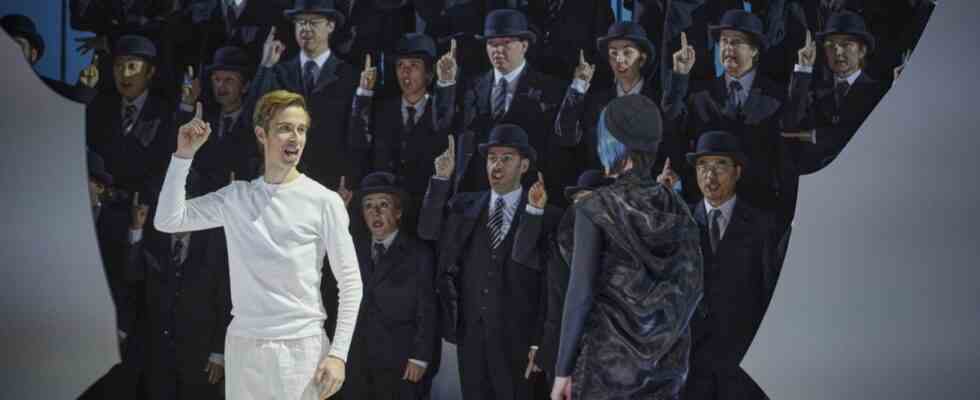Did the British Mathematician Alan Turing caused the turning point in the Second World War by cracking the German Enigma encryption machine and was he also the decisive pioneer of artificial intelligence? And then also a pioneer of the gay movement? This life calls for grand opera. Based on the 2014 Hollywood biopic, the Nuremberg State Theater has poet Georg Holzer and composer Anno Schreier commissioned to write an opera about the amazing life of Alan Turing, now “Turing” has premiered, directed by the director of the Staatstheater, Jens-Daniel Herzog.
Already the first, few tones of the instrumental prelude – dry, hard xylophone – point to the brutality of the event, the funny rhythmization to Vaudeville, but to a not too shocking performance. In their opera, Holzer and Schreier attempt a balancing act between tragedy and comedy that even the most gifted strategic gymnasts would fail. Even half-hidden hints, the use of the bassoon or the quote from the second verse of the British anthem, don’t really save the concept. Alan Turing is initially a self-absorbed math genius who competes with outstanding colleagues like Kurt Gödel and develops feelings for a classmate “who loves numbers like me”. What remains is an unfulfilled, half-hearted love, the music retreats back to the repetition pattern of the strings, a saxophone bleats rhythmically into it.
That is too thin for a traumatically formative situation, which in the end makes up the whole tragedy: Turing saves lives by disposition and professional reasons and is destroyed as a human being for his erotic disposition, which goes beyond the norm, forgotten as a mathematician. Even then there was a tendency to condemn someone morally and also to defame their professional performance. What impressively comes across the ramp this evening, despite the low-tension and often silly libretto – “when it’s finally on track, shit will happen and you’re dead” – and the somewhat entertaining music is what Martin Platz sings and plays outstandingly Main character of Turing. Above all, the fact that its ambiguity is only an external reflection of an inner conflict caused by the moral laws of the time.
It is incomprehensible why Turing throws himself at the court with frank statements about his sexuality
Nevertheless, Turing is only of limited use as a champion of sexual liberation. It is incomprehensible why he throws himself to the court with frank statements about his sexuality. Instead of prison, he chooses hormone therapy and soon commits suicide. The key scene in which Turing emancipates himself from a shy nerd to a sexual freedom fighter is missing. That would have saved the opera, which has now become a musical: light-footed, good-humoured – that’s where text, music and direction meet in their revue-like strategy of having a bit of fun. Actually, the television ballet should be turning the corner at any moment, but the choir jumps over the ditch of dramaturgy – singing and acting in top form.
Composer Schreier, who defines mathematical aesthetics in minimal music, uses the technique of continuous repetition as a basic pattern over which he lays all possible styles of music, from early baroque dirge to Handel’s magnificent choruses, Bach’s counterpoint to jazz and rock impulses. The latter with penetrating drums, which always creates distance rather than initiating empathy. The loud counting of the rhythm blocks thinking and offends musical sensitivity: as if a defibrillator were placed on a healthy heart – with a fatal end. And that’s how the whole idea worked: as if you were trying to figure out the strange Turing with jokes and dollery. At the end we see him giggling childishly in heaven. All not so bad.

